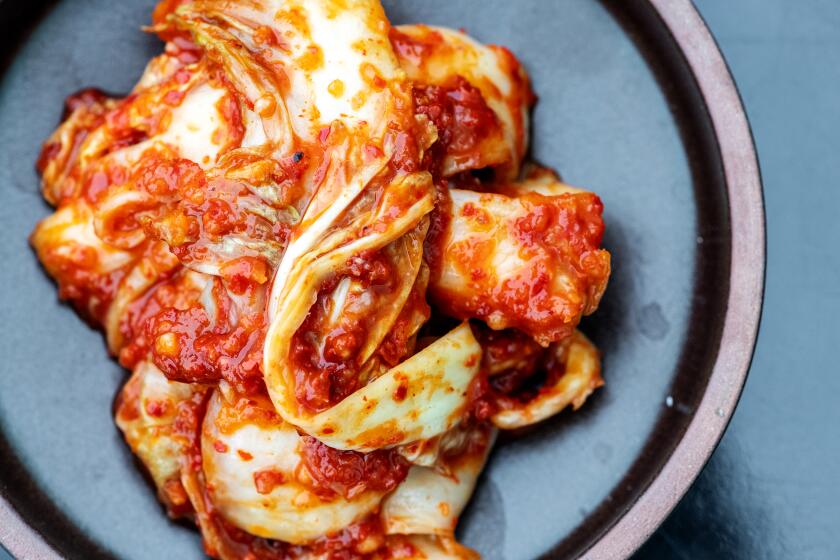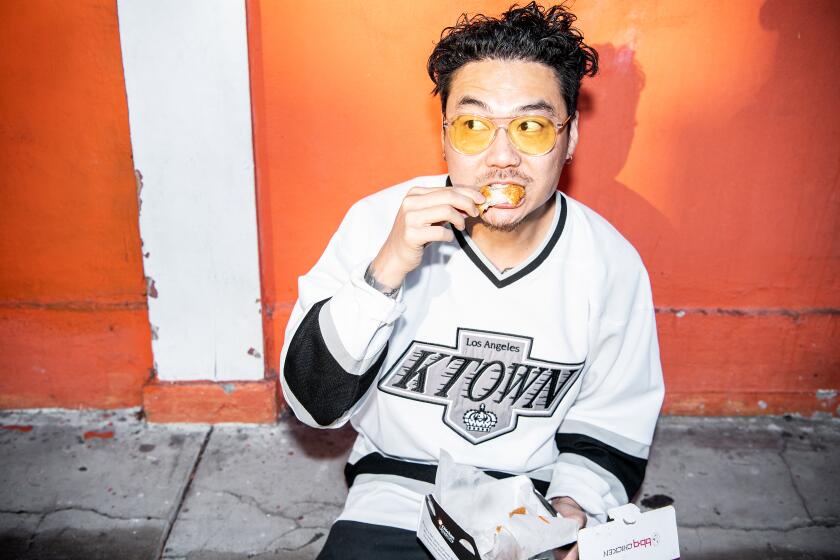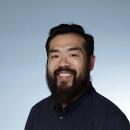Redefining the Korean experience
- Share via
The Korean experience does not fit a template. There is no one way to define identity. We come to understand our Korean identities through different avenues and on our own time. Like kimchi, it cannot be rushed.
The Times spoke with six people with Korean roots about kimchi, food and how they’ve come to — or are still learning to — understand their heritage.
Nyesha Arrington
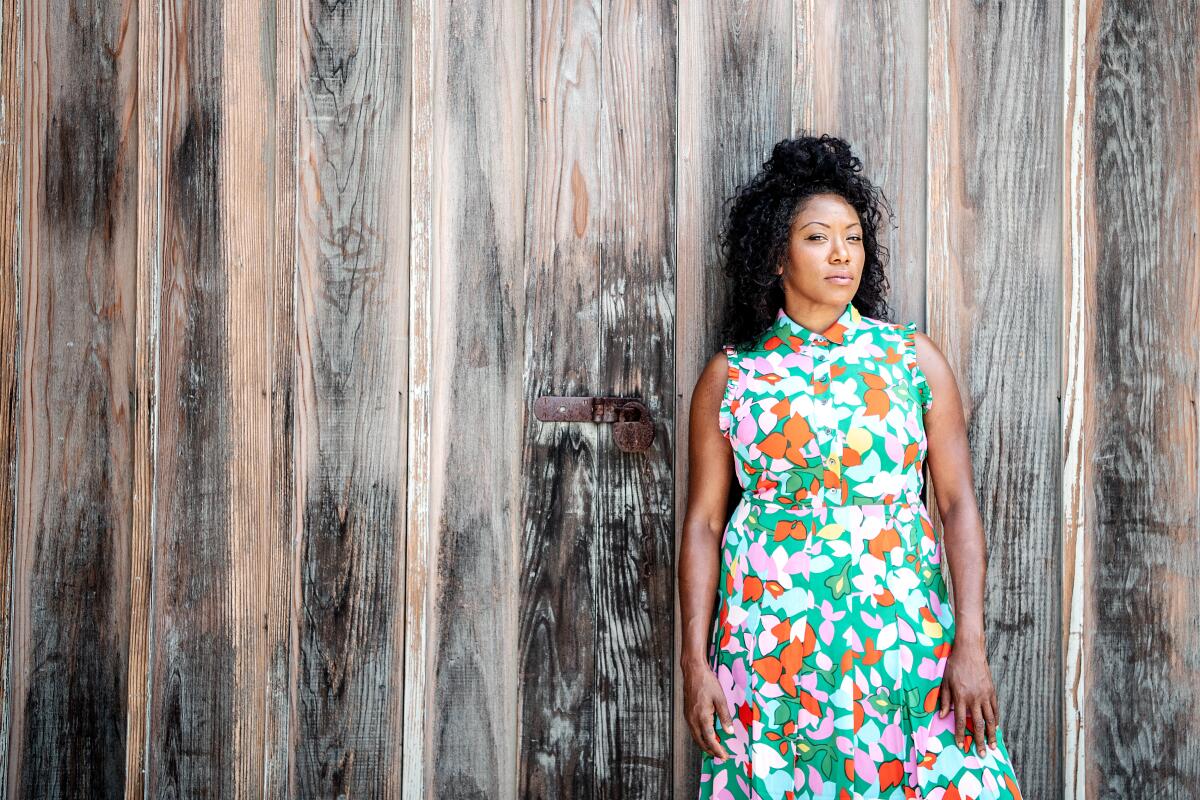
“Top Chef” alum Nyesha Arrington is known for her restaurants Leona and Native and for dishes that celebrate Los Angeles and local farms. Korean cooking was Arrington’s introduction to food. “It was my first experience with love,” she said while recalling memories of her late grandmother, who would feed her nakji (octopus) and teach her how to make kimchi.
“At the time, I didn’t know I was biracial or there was a label on me. But for me to experience her and where she came from, it resonates in my soul,” she said. “It has blossomed and fruited within my life. Without her really being the conduit of her journey and her life into mine, I could be a completely different person today.”
Did you ever feel like people challenged your Korean identity?
“I think when people find out I’m Korean, they always say, ‘Oh, what side?’ or ‘How much?’ ‘What’s your percentage?’ I was pushed, internally, to do that DNA test because I was curious, but that doesn’t validate me, because my experience comes from the culture. It’s rich in the culture, from my grandma.”
What are some lessons you’ve learned about yourself and the spaces you occupy?
“The process of learning is to unlearn. My parents and grandparents made me very strong. I was pushing down emotions and showing up and pushing forward, all the time, every day. I think now I feel more comfortable because of life experiences. No one can really hold precedent over you, and that takes time to learn.”
Kim Chi
As the first Korean American contestant on “RuPaul’s Drag Race,” Kim Chi wowed audiences and helped shine a spotlight on Korean culture while also uplifting a community of “Seoul queens” in the underground South Korean drag scene.
Born Sang-Young Shin, Kim Chi moved back and forth between South Korea and Michigan until she entered high school. Vacillating between two cultures was jarring at times, but Kim Chi always felt grounded in her Korean identity.
“I always knew deep down in my core I was Korean,” she said. “What really cemented me as being proud to be Korean was a lot of Korean pop culture. That was my connection to Korea, and I connected more to that culture than American pop culture.”
How much does your Korean identity influence your stage presence?
“The main reason why I chose my drag name Kim Chi is because I’ve always felt Koreans were very underrepresented in pop culture, so I wanted to pick a name that was as Korean as possible. Just to be able to have such a Korean word all over the posters at the gay clubs and bars and then later when I got on ‘Drag Race,’ to be able to be part of this massive underground gay culture, which is now going mainstream, to be able to represent Korean culture is basically what I’ve wanted to do and what I wanted to accomplish.”
What is one of your fondest kimchi memories?
“Every time I’d go over to my grandmother’s house, she’d always save this mukeunji [well-fermented kimchi] that’s been resting in her kimchi naengjanggo [refrigerator] for months, because she knows how much I love it. I feel like a lot of grandmas show their love through food, so the fact that she saved all this mukeunji for me just so she can cook it with pork — that’s love.”
An incomprehensive but indisputably correct guide to the great kimchis of Los Angeles.
Kristen Kish
Chef Kristen Kish was adopted from South Korea when she was 4 months old and was raised in Michigan.
Growing up, she didn’t feel pressure to “be Korean.” But her identity is something she’s still grappling with. After she won Season 10 of “Top Chef,” though, the exposure opened her to new communities that have welcomed her warmly, including fellow Korean adoptees.
“That community really reinvigorated my appreciation for who I am,” she said. “They helped me define who I was through that label and identification, and for that I will always be grateful. At the end of the day, it’s a connection.”
Did you feel any pressure as a child to “be more Korean?”
“I didn’t feel any pressure that I had to be more Korean. I did feel pressure that I had to fit in a very gender-norm world, in that sense, and what success looked like. But that had nothing to do with my ethnicity, my race, where I come from and who I am. That was just an internal struggle I always had. I never felt like I had to be more Korean. I felt like I had to be more effeminate. I felt like I had to be more excited to date boys. I felt like I needed to go to a certain college, drive a certain car.”
How have you come to understand your Korean identity through food and cooking?
“I’ve been very vocal about the idea that I don’t feel good and I don’t feel right to cook Korean food. I cannot connect the dots, and most likely it’s me probably being scared to do it. They say it all the time: There’s no definition on how you need to be Korean. You can be a Korean, you can look Korean, you can try to cook Korean food and have it turn out like s—. That doesn’t make you any less Korean. It’s already in you.”
R.O. Kwon
Writer R.O. Kwon (“The Incendiaries”) was born in Seoul and raised in Cerritos, home to a large Korean community.
Surrounded by so many Koreans, Kwon rarely felt like her identity was under the microscope. But that changed abruptly when she went off to college at Yale.
“I think a giant difference that took place almost immediately — and then it held true for a long time — was for the first time in my life, I would so often be the only Asian woman in the room,” she said.
That experience helped define her as a writer, she says.
“People so often ask, ‘Who are you writing for?’ and I used to think my answer to that — [she writes for herself] — was boring. But then I realized if I’m centering myself as a reader, then that’s a Korean American immigrant queer woman’s body, and this body has not very often been centered in American letters. And so, of course, that definitely has political implications.”
Did you ever feel like your Korean identity was something you had to carry with you?
“I felt that at least when I was in college — the starkness when you’re the only Asian woman in the room over and over again. I feel in those situations less like a representative of Korean America and I feel more like the representative of the other.”
What would you tell your younger self?
“I didn’t come across Korean American writers until after college. ... It wasn’t that I didn’t want to read them. It was that I literally did not know to look for it. Granted, there were a lot fewer Korean American writers publishing when I was in college, but I wish I had started reading Korean American writers a lot earlier. I wish that had been part of my childhood the way Henry James was, the way Edith Wharton was. I wish that had been the air I’d been breathing much earlier.”
Jonathan Park
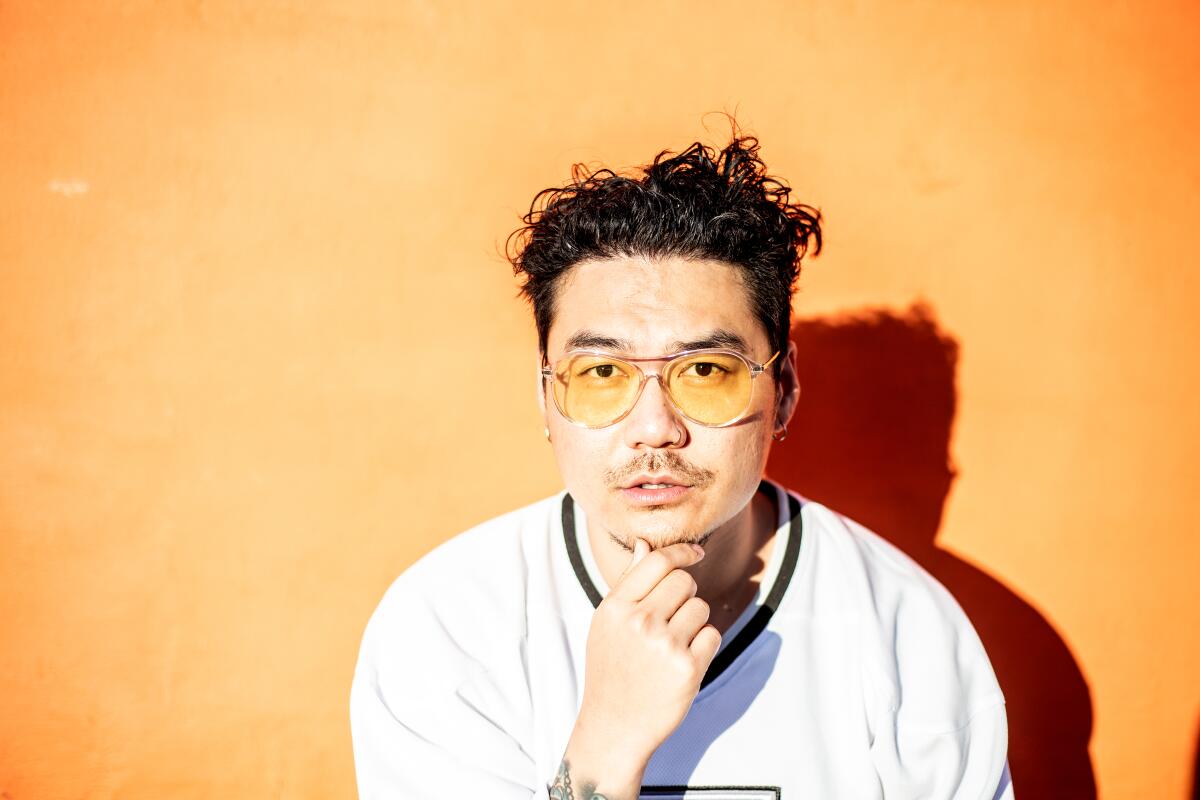
Despite growing up Korean in Koreatown, there were times Jonathan Park says his identity was challenged. He recalls the “AZN movement” of his adolescence, when other young Asian Americans unabashedly displayed their cultural pride through the clothes they wore, the music they listened to and the circles they traveled in.
“There was this strong community of Koreans who hung out with only Koreans, and there was a style to it. There was an aesthetic, and if you didn’t fit that, they made you feel like you weren’t from this ’hood or Koreatown or a real Korean American,” said Park.
When did you start gaining confidence in your Korean identity?
“Hip-hop taught me to be unapologetically Asian, because hip-hop is unapologetically Black. Seeing Black artists in hip-hop and how prideful and comfortable they are with their Blackness and how they address it is what made me realize that’s the same s— I have to do with me. I can’t pretend to be somebody else.”
For nearly three years, a mural of Jonathan Park’s face adorned a white wall outside Catalina Liquor in Koreatown, his home and the neighborhood he’s become inseparably tied to as the rapper Dumbfoundead.
Talk about the dangers of people who assign themselves as gatekeepers of identity.
“Our culture is evolving. Our people are evolving. And I think some people are just traumatized from the past racism they’ve experienced. But the truth is, [Korean identities are] constantly evolving, and for people to be able to appreciate us, we have to invite them into our community.”
Michelle Zauner
When musician Michelle Zauner, who performs as Japanese Breakfast, lost her mother — her connection to her Korean heritage — she’d sometimes go to H Mart and begin to cry, thinking of the times they’d spent together in the kitchen or over a meal.
Their relationship had been forged over food, and it was through food that Zauner began to heal. That includes learning to make her own kimchi.
“[There was] this fear that I was all of a sudden not going to be Korean anymore, because I didn’t have her as an access point to my heritage, and that I was going to lose that if I didn’t work harder to maintain that and preserve that in myself,” said Zauner.
How did Korean food help you understand your identity?
“There’s so many different ways my mom made me feel like our common interest in Korean food was what made her reaffirm that — that was what made me Korean. Growing up, I was never fluent in Korean, and what made me feel like a Korean person was when she always would say, ‘Oh, if you eat that, that’s a very Korean thing’ or ‘Oh, I can’t believe you like that. That’s how I know you’re Korean.’ There was always that reinforcement of I’m good and more Korean if I eat well and enjoy these things.”
Talk about the dangers of people who assign themselves as gatekeepers of identity.
“I think it’s hard, because people are protective and angry about the things they’ve personally endured and they take it out on other people. Have compassion. I think there’s a spectrum there, in the same way that there is with sexuality. There are so many different ways that people interact with it, and if someone wants to claim that part of themselves, they should be allowed.”
More to Read
Eat your way across L.A.
Get our weekly Tasting Notes newsletter for reviews, news and more.
You may occasionally receive promotional content from the Los Angeles Times.
